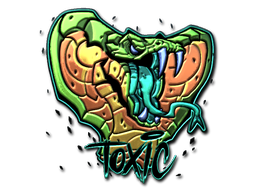Insightful Updates
Stay informed with the latest news and trends.
CSGO Toxicity Reports: When Gaming Turns Into a Virtual Soap Opera
Dive into the dramatic world of CSGO toxicity reports—where gaming drama rivals reality TV! Uncover the wildest moments now!
Unmasking CSGO Toxicity: The Psychology Behind In-Game Rage
In the world of CSGO, player interactions can often devolve into chaos, giving rise to what is commonly referred to as toxicity. This in-game rage is not merely a byproduct of competition; it is deeply rooted in psychological factors. Players often experience heightened emotions stemming from performance pressure and the desire to win, which can manifest as aggression when things don’t go as planned. The anonymity provided by online gaming can further exacerbate these feelings, leading individuals to express frustrations in harmful ways that would typically be unacceptable in face-to-face interactions.
Moreover, the communal nature of CSGO can amplify these toxic behaviors. Players often find themselves in situations where teamwork is critical, and any perceived failure can trigger a cycle of blame and resentment. According to psychology experts, this is known as the spiral of negativity, where one player's toxic behavior influences others, creating a toxic environment that can ruin the gaming experience for everyone involved. Understanding the psychology behind this rage is essential for fostering a more positive gaming culture and mitigating the negative impact of toxicity in online spaces.

Counter-Strike is a highly popular first-person shooter game series, known for its competitive gameplay and tactical elements. Many players seek to enhance their gaming experience, including learning how to cs2 hide hud for better focus during matches. With various modes and community-created content, it remains a staple in the esports scene.
From Teammate Betrayals to Epic Comebacks: The Greatest CSGO Drama Moments
The world of CSGO is not just defined by its incredible gameplay and competitive spirit but also by the intense drama that unfolds among players and teams. One of the most gripping instances of teammate betrayals occurred during the infamous ELEAGUE Major in 2017 when a well-known player unexpectedly switched teams, shaking the competitive landscape. Fans were left in disbelief as social media buzzed with reactions, making it one of the most talked-about moments in esports history. Such betrayals often lead to heated rivalries, as former teammates face off in high-stakes matches, igniting a passionate fire among fans.
However, amidst the chaos of betrayals, epic comebacks have become a hallmark of the CSGO community, showcasing the resilience and determination of players. One remarkable example was the rise of a less regarded team who, after falling behind in a match, staged a stunning comeback to clinch victory, demonstrating the unpredictability of CSGO. This unexpected turnaround not only won them the match but also earned them a dedicated fanbase, reminding everyone that in the world of esports, anything can happen. Such moments continue to define the narrative of the game, captivating audiences and creating unforgettable memories.
Why Does CSGO Bring Out the Worst in Players? Analyzing Toxic Behavior in the Community
Counter-Strike: Global Offensive (CSGO) has garnered a massive following since its release, yet this popularity comes with a darker side: toxic behavior among players. The highly competitive nature of CSGO promotes a win-at-all-costs mentality, which can lead to frustration, anger, and ultimately, toxicity. When players face defeat or feel their teammates are underperforming, they often resort to verbal abuse, harassment, or even falling into a cycle of negativity themselves. This toxic environment not only impacts individual gameplay but also diminishes the overall experience for the entire community.
Several factors contribute to this phenomenon. Firstly, the anonymity provided by online gaming allows players to express themselves without direct consequences, leading to an increase in offensive language and behavior. Furthermore, the team-oriented gameplay means that players are oftentimes reliant on others for their success, which can heighten stress and lead to blame-shifting. Consequently, it's essential for the CSGO community to acknowledge these issues and strive towards creating a more positive gaming atmosphere, where players can enjoy the competition without succumbing to the worst aspects of their personalities.